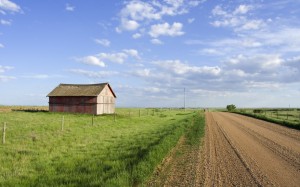 A call from my brother on the last day of 2010 set off reflections on moving on after setbacks. What gave me the courage to keep going despite numerous setbacks? And I recognized a key factor was our father’s persistence despite his setbacks.
A call from my brother on the last day of 2010 set off reflections on moving on after setbacks. What gave me the courage to keep going despite numerous setbacks? And I recognized a key factor was our father’s persistence despite his setbacks.
Our father’s family moved to Saskatchewan, Canada from the Kuban, a Mennonite Brethren enclave developed in the foothills of the Caucasian Mountains near the current Chechnya. He was 11 and the oldest of a growing family. An avid reader, my father only made it through Grade 7, having had to learn English, but at 21 he headed for a short-term winter Bible institute in southern Saskatchewan. Working on threshing crews he began saving money.
At 23, free of family responsibilities, Dad went south to Tabor Academy in Kansas, graduating from high school at 28. He loved chemistry and his teacher urged him to go on in science, but he was in love and without the funds to go to college. So he taught a year and married. The year was 1929, and with the stock market crash initiating the Great Depression, he headed west with Mom to California. He worked the orchards in summer and spent the fall semester studying at the Bible Institute of Los Angeles, when his funds ran out. Setback No. 1.
 A Model T Ford brought Dad and Mom to British Columbia, where his parents had moved, to start over, not as a chemist or teacher but as a farmer. By the time the chicks he bought had grown, the market for chickens had collapsed. A reader and would-be writer, he scrambled to provide for his family with whatever he could grow that would bring in a few pennies. Five years later a flood triggered an abandonment of structures already built, setback No. 2, and prompted a move to the community in which several brothers had already started anew.
A Model T Ford brought Dad and Mom to British Columbia, where his parents had moved, to start over, not as a chemist or teacher but as a farmer. By the time the chicks he bought had grown, the market for chickens had collapsed. A reader and would-be writer, he scrambled to provide for his family with whatever he could grow that would bring in a few pennies. Five years later a flood triggered an abandonment of structures already built, setback No. 2, and prompted a move to the community in which several brothers had already started anew.
In Abbotsford, the sale of Mom’s inherited 20 acres of wheat land in Nebraska got them 20 acres filled with large tree stumps and bush. Painstakingly he started clearing land, blasting and burning stumps, with me as eight-year-old dragging together bush to keep fires going in the stumps and then digging around roots deep enough to chop them off below plow levcl. Fifteen years later he not only had a modern barn but also the cooling system to ship milk from a small dairy herd to what was called the fluid market in Vancouver. The two-thirds of an acre of raspberries planted on the first plot cleared of stumps provided an annual cash crop to pay off some of the debts accumulated in winter—eventually we tended two acres of raspberries and two of strawberries. And the year after I left home he was given the Master Farmer Award for our region—won by a man who kept adapting to circumstances despite setbacks.
While my father and I worked together blasting stumps, hoeing raspberries and silage corn together, milking cows together, he shared what had been his dreams, his successes as a high school debater. I discovered how he adapted to a depression, which had also short-circuited first attempts at developing a farm. Through it all his faith in Christ, his Savior and Lord, ran like a scarlet thread. He had thought through a government approach to help families out of the depression, and the description of it became his first published article in a regional weekly. A couple of years later the Canadian government adapted his approach, providing a Family Allowance for every child in a family.
Those talks at the end of a hoe or while we chopped down corn stalks for silage or while milking cows kept resonating in my soul when a broken leg during a mountain climbing incident kept me in a mission hospital bed in northern British Columbia. That setback had me paging through issues of Christian Life Magazine, where an ad shouted “You can write.” I sent off the $15 gained from working in a mine for the seven lessons of The Beginning Christian Writer. Months later, on an island where I spent the summer as Forest Service dispatcher, I completed the lessons. Ten years later my desk as editor of The Christian Bookseller Magazine was next to the woman who had been my first instructor during that correspondence course. Now I was learning from the man who had created the course, Robert Walker, who edited the articles I wrote for Christian Life Magazine. My first real setback as an adult set me up for a lifetime as writer and editor.
A setback as writer resulted in 20 years on the board of Voice of Calvary Ministries in Jackson, MS. I had met John Perkins, a brilliant African American Christian, in a hotel café in Dallas after a Billy Graham address in the Cotton Bowl during Campus Crusade for Christ’s student Expo in 1972. Six months later, traveling from seminary to seminary as Moody Press editor, I stopped at the site of John’s experiments in cooperative housing, a credit union, a cooperative clothing store, and medical center to help poor African Americans get out of poverty. One of his young leaders, an early convert to Christ, hosted my visit.
I decided to write an article on John Perkins and his bold approaches to help African Americans, but first I wrote an article about his protégé. I submitted it to several take-home paper editors. None would take it. Unwilling to accept that setback I incorporated the material in curriculum I was writing for inner city middlers and in leadership material I was writing for Christian Service Brigade. I still wanted to do the John Perkins’ story, but again was turned down. When John came to Chicago to visit with African American students at Moody Bible Institute, I invited Moody Magazine editors to coffee with him. The strategy worked and I got the article assignment. The results were so amazing that John invited me to become a founding member of his national Board of Servants. Now my unwillingness to accept setbacks as writer brought me into close contact with men and women, both white and African American, whose passion to help those in the poorest section of Jackson, MS matched mine.
More setbacks followed in my career, but each time the example of my father and a shared faith in Christ turned a setback into an advance. I learned that setbacks are in reality God’s launching pads.

